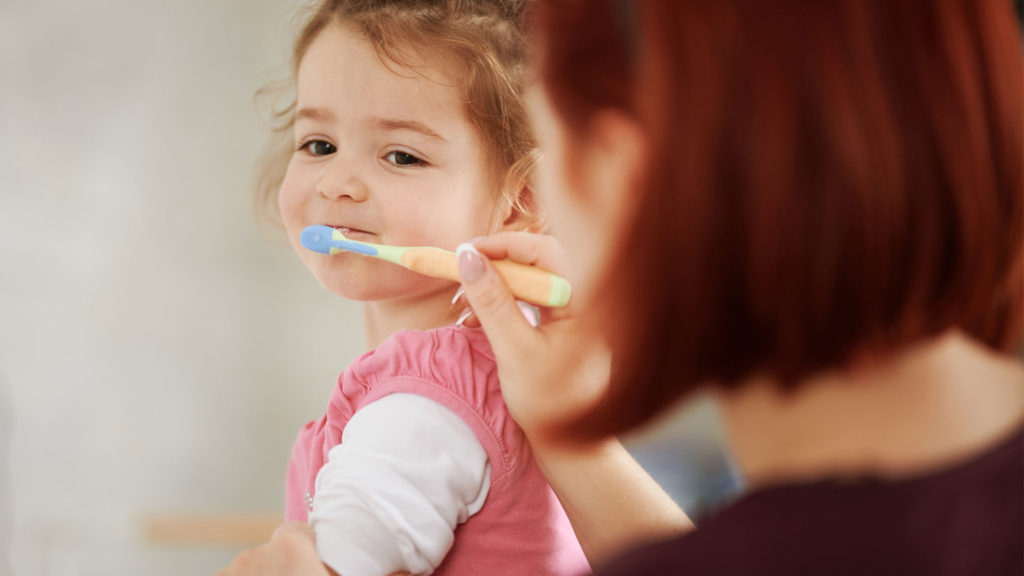What you should know about caring for kid’s teeth and gums.
Big smiles start small. Even before the first tooth erupts, forming healthy dental habits is important for your children’s long-term health. By implementing good habits in the beginning, children learn to care for their teeth and have fewer dental issues throughout their life. Fairview Mesaba Clinic pediatrician, Dr. Lisa Buenger, breaks down the importance of child dental health and things to know for every stage.
Pediatric Dental Care at Every Age
Babies
Even prior to their first teeth, good mouth hygiene should be established. Clean your baby’s gums twice a day. This is typically recommended after the first feeding and before bed. This will help keep any sugars lingering around from impacting the gums.
Do not share utensils, cups, spoons, or toothbrushes with your infant. Parents should never put the child’s pacifiers in their own mouths. This increases the baby’s exposure to potentially unhealthy bacteria.
As soon as teeth first erupt parents should be brushing or wiping them with either a toothbrush or cloth at least twice a day. Use a grain of rice size amount of toothpaste. They do not need to spit it out or rinse it out. The minuscule amount left over will help fight cavities. At this point, you can ask your child’s provider about fluoride treatment options.
Ages 1-2
Around the one-year mark, you can schedule your child’s first dentist appointment. From here on out, they should pay them a visit every six months. If this is not possible, aim for age three. In the meantime, the child’s primary healthcare provider should be checking their teeth at well-child visits.
Ages 3-9
When children hit around the age of three, you can start using a pea-size amount of toothpaste. This time, the child should spit out any remaining paste but does not need to rinse. The remaining paste residue will prevent tooth decay. At this age, you can also introduce flossing if recommended by your dentist. It is recommended that parents assist with brushing and flossing until around age 10.
Ages 10+
At this stage, kids should have habits down that include brushing twice a day and flossing once a day on their own. They should be seeing a dentist every six months and being encouraged to eat healthy foods and avoid sugar.
Avoid Sugar
One of the most beneficial steps you can take in your child’s dental health is avoiding sugar. There is no good reason to introduce candy or soda to young children. It will only lead to an early sweet tooth and more temper tantrums for sugary treats. Candy and soda will also be detrimental to their health.
Babies younger than one year old should not drink any fruit juice according to a recommendation from the American Academy of Pediatrics (AAP). Fruit juice has no nutritional benefit and fresh fruit is a healthier alternative for older children because it has less sugar and more fiber.
Another helpful dental move is limiting the time exposure to sugars. Sipping on juice or milk all day long (or night) regardless of whether it’s diluted or not, increases the likelihood of cavities. Therefore, try not to let children sleep with bottles or carry around sippy cups.
Other Helpful Tips
Besides sugars, avoid crackers and gummies. These foods get stuck easily in crevices and increase the risk of cavities. Rinsing the mouth with water and brushing teeth after these foods significantly prevents decay.
At around six months, children should be introduced to a sippy cup. You can fill it with water and use it to rinse the mouth after meals, formula, or breastmilk. The goal is for little ones to use it by nine months and switch off of a bottle completely by 12 months. When children are around 18 months to 24 months old, you should be encouraging them to use an open face cup. This helps them avoid constantly walking around sipping caloric beverages. Water should be the only thing allowed in a sippy cup at this age. When children drink from an open cup, they tend to be sitting and drinking for a shorter amount of time. This means their teeth are exposed to less sugar or acid overall.
Keeping Baby Teeth Healthy Matters
Although all children lose their baby teeth, they play a long-term role in a child’s dental health for four reasons.
- First, children are constantly using their baby teeth to eat and chew on things as they grow. If there is tooth decay, the child will feel it. This pain will be no fun for your child or you.
- Secondly, baby teeth play an important role in the development of the jaw. They hold the space for later teeth and if decayed or lost, it can cause effects down the line on how teeth come in and how the jaw develops.
- Thirdly, if children need dental work that requires anesthesia, the sedative could put your child at unnecessary risk for side effects or complications.
- Lastly, baby teeth contribute to the proper development of speech.
Big Smiles Start Small
Dental health has a huge impact on your entire health. That’s why forming healthy dental habits for your children is vital from the beginning. If you want to learn more about pediatric dental best practices or schedule an appointment, visit Fairview MyChart or call 218-362-6937.
For more about Fairview Range, visit fairview.org/range.

